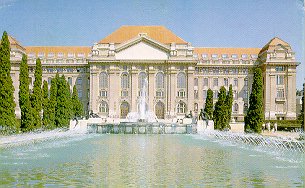Lajos Kossuth University, Debrecen

We Franz Joseph I Emperor of Austria, King etc. of
Bohemia and Apostolic King of Hungary.
The faithful members of the Upper House and House of
Representatives of our favoured Hungary and fellow-countries have
introduced, by common agreement, to our Majesty the following law for
royal assent:
1.§
Two royal universities authorised with academic freedom are to be
estabilished by gradual development in Pozsony and Debrecen.
2.§
After the enactment of this edict as law, at a date to be appointed by the
Minister of religion and public education, the state hospital in Pozsony,
and were in the meanwhile a public hospital suitable for the purpose of
university education to be estabilished in Debrecen, and the free royal
town of Debrecen tenders this to the state without compensation, then the
latter, too, will be taken into the possession of the ministry of religion
and public education as a complementary constituent of the medical faculty
of the said university.
We acknowledge this edict as law, and everything comprised therein jointly
and severally, as rightful, dear and confirmed, and, by virtue of our
royal power, we hereby ratify, sanction and give royal assent to it, and
will duly obey it Ourselves and have our Followers obey it likewise.
Dated in Bad-Ischle, on the seventh day of month of July in the year of
Nineteen-twelve.
Franz Joseph
History
Debrecen was raised to the status of a burgh in
1361. With a population of 220,000 it now ranks as the second biggest of
Hungary's cities.
Its position as an economic and cultural centre was guaranteed with the
founding, in 1538, of the Calvinist College. This institution was in the
forefront of educational and theological developments in this part of
Europe and as such it became the cradle for the emergence of a distinct
school of thought that was recognizably Hungarian in character. Nearly
all of the College's professors had attended famous European universities
such as Basel, Tübingen, Göttingen, Wittenberg and Utrecht, and
they were later to become guardians of Hnungarian culture and keep it
open to Europe among the storms of history so often shaking this region.
The success of the Calvinist College paved the way for establishment of a
state universsity in 1912. This institution, which was founded on the
example of the classic European universities, worked for a long time
with four faculties - arts, medicine, law and theology. However for
forty years now, medical doctors and clergy have been trained in
separate institutions, while the university, now bearing the name of
Lajos Kossuth, the country's great patriot and statesman, who was
the leader of the country for a short time during the 1848 Hungarian
Revolution, has retained two regular faculties: arts and science.
With its two faculties, 3800 students (146 from abroad), 600
correspondence students, 500 teaching staff and 1000 other personnel, the
university ranks fifth in size among the country's institutions of higher
education.
397 staff members hold higher scientific degrees, 7 of them are members of
the Academy and 28 are doctors of science. The main building of the
university was completed in 1932, while the chemistry building, the mathematics building and the biology building were inaugurated in 1969, 1984 and 1993 respectively. These from the core of a campus which comprises at least 17 separate buildings.
Academic Structure of the Institution
Principal Academic Divisions:
Faculties: Since 1952 the university has had two faculties, the Faculty of
Arts and the Faculty of Sciences. The 36 Departments of the Faculty of Arts
are grouped around 7 Institutions (excluding 10 independent departments),
while the 24 of the Faculty of Sciences are grouped around 5 Institutions.
a) Faculty of Arts
Major subjects: Hungarian Linguistics, Literature and Ethnography, General
and Applied Linguistics, World Literature, Finno-Ugrian, Russian, English,
German, French and Italian Literature and Linguistics, Chinese Culture and
Contemporary World History, Hungarian History, Classical Philology, General
and Educational Psychology, Adult and Continuing Education, Philosophy,
Economics, Sociology, Political Science, Performing Skills and Drama.
b) Faculty of Sciences
Major subjects: Mathematics, Theoretical and Applied Information Science,
Experimental, Theoretical and Solid State Physics, Isotope Applications,
Organic, Physical, Applied, Colloid, Inorganic and Analitycal Chemistry,
Biochemistry, Ecology, Botany, Evolutionary Zoology and Anthropology,
Genetics, Social, Physical and Applied Landscape Geography, Mineralogy and
Geology, Mereorology.
Principal Research Centers or Institutes
Departments which have research laboratories:
- Department of Experimental Physics
- Department of Solod State Physics
- Isotope Laboratory
- Department of Applied Chemistry
- Department of Physical Chemistry
- Department of Organic Chemistry
- Research Group for Antibiotics of the Hungarian Academy of Sciences
- Department of Inorganic and Analytical Chemistry
- Department of Biochemistry
- Department of Mineralogy and Geology
Other units:
Centre for Foreign Languages, Audio-Visual Centre, Kindergarden, Nursery,
Demonstration Primary School, Demonstration Secondary School, Distance
Learning Centre.

